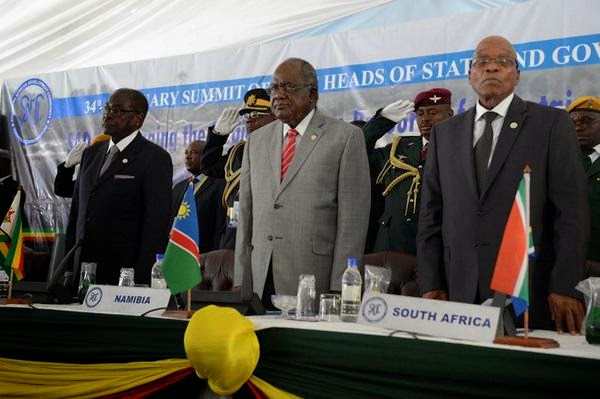- WICKNELL CHIVAYO left school at 15
- DISGRUNTLED Zimbabwe police stage uniform protest.
- MNANGAGWA wife Auxillia drops charges against nine women who boed her in Manicaland
- O.J. Simpson dies of cancer , aged 76.
- South Africa ANC is the cause of ZIMBABWE troubles claims Zimbabwe opposition politician Job Sikhala
SADC Heads Bar 258 Million SADC Citizens Access To Illegally Reconstituted Regional court’

Following the decision to deny the 258 million SADC citizens access to the regional court of the SADC Tribunal, taken during the 35th SADC Summit of Heads of State and Government in Botswana [17-18 August 2015], SADC Tribunal Rights Watch is gravely concerned.
The SADC leaders have taken this retrogressive step unilaterally – and without consultation with the people of SADC. This flies in the face of Article 4 of the SADC Treaty where SADC member states are bound to act in accordance with the principles of, among other things, “human rights, democracy and the rule of law”.
Under international law, the Tribunal was considered an international court just like the European Court of Justice or the East African Court of Justice. It was created to consider disputes between member states, individuals, organisations or institutions, staff of the SADC secretariat and the community and SADC.
Instead of building on the achievements of the internationally respected SADC Tribunal, which comprised leading judges from across the region, the SADC leaders have approved the resolution to establish the Southern African Development Community Administrative Tribunal (SADCAT).
Regrettably, the mandate of the SADCAT will be confined to interpretation of the SADC Treaty and Protocols relating to disputes between member states, thus barring individuals and legal persons access to justice when SADC citizens have exhausted all legal remedies within their own countries.
Furthermore, this misguided and self-serving decision by the SADC Heads of State removes the court’s human rights mandate.
As Human Rights Watch (HRW) pointed out in a press statement issued on 16 August 2015, there are concerns about human rights and rule of law issues in Zimbabwe (which instigated the dissolving of the SADC Tribunal in May 2011), Angola, Swaziland and South Africa.
“SADC member states have taken little action to ensure respect for human rights and the rule of law in all southern African countries, despite identifying peace, security, and the protection of human rights as key concerns within the region,” HRW said.
SADC’s stated vision is “that of a common future within a regional community that will ensure economic well-being, improvement of the standards of living and quality of life, freedom and social justice and peace and security for the people of southern Africa.”
As HRW noted, “Respect for human rights and the rule of law can bring peace and stability and help drive the regional economic development that improves people’s lives.”
Meeting ahead of the SADC Summit, more than 100 business leaders of the Southern African Business Forum (SABF) expressed their grave concerns.
“Investors require legal certainty and failure by SADC member states to implement their regional obligations have serious implications for business. The removal of access by private actors to the SADC Tribunal has reduced the legal remedies available to ensure legal compliance in SADC,” they said.
It is clear that this action by the SADC leaders has usurped the independence of key democratic institutions within the region and will impact on urgently needed investor confidence and economic development.
In summary, the SADC leaders have:
1. Refused to adhere to Article 15 of the SADC Treaty where the Tribunal had “jurisdiction over disputes between persons and [member] states.”
2. Continued, unlawfully, to prevent part-heard cases from being heard in the Tribunal.
3. Allowed all SADC member states to unlawfully to vote for the elimination of individual access to the court when in fact four of the states should have recused themselves on the grounds that they had cases pending against them – and therefore had had a vested interest in stopping the court from hearing those cases.
4. Refused to treat decisions of the Tribunal as “final and binding” and therefore of paramount importance to act upon, as Article 16 of the Treaty provides.
5. Failed to impose sanctions against states that continue to fail to comply with the decisions that the SADC Tribunal has made, as Article 33 provides.
6. Failed to adhere to the recommendations of the World Trade Institute (WTI)’s independent report, produced by Dr L Bartels from the Law Faculty at the University of Cambridge, which was commissioned by the 2011 SADC Summit.
7. Failed to follow the advice of SADC member states’ ministers of justice and attorneys general who endorsed the WTI report.
In conclusion, SADC Tribunal Rights Watch notes that the SADC member states, by Articles 6 (1) and 4 (c) of the Treaty, agreed to refrain from taking any measures likely to jeopardise human rights, democracy and the rule of law.
In taking away the rights of individuals to approach the SADC Tribunal and preventing part- heard cases from continuing, the SADC leaders are dictatorially and without regard for human rights, democracy and the rule of law, bringing SADC into regression where investment will be stifled and people will suffer.
As history has demonstrated, state leaders who diminish or destroy access to the courts and key independent institutions, do this to serve their own interests of wealth and power at the expense of their people’s welfare. Ben Freeth – Spokesperson
SADC Tribunal Rights Watch, Zimbabwe
Source: SADC Tribunal Rights Watch, Zimbabwe